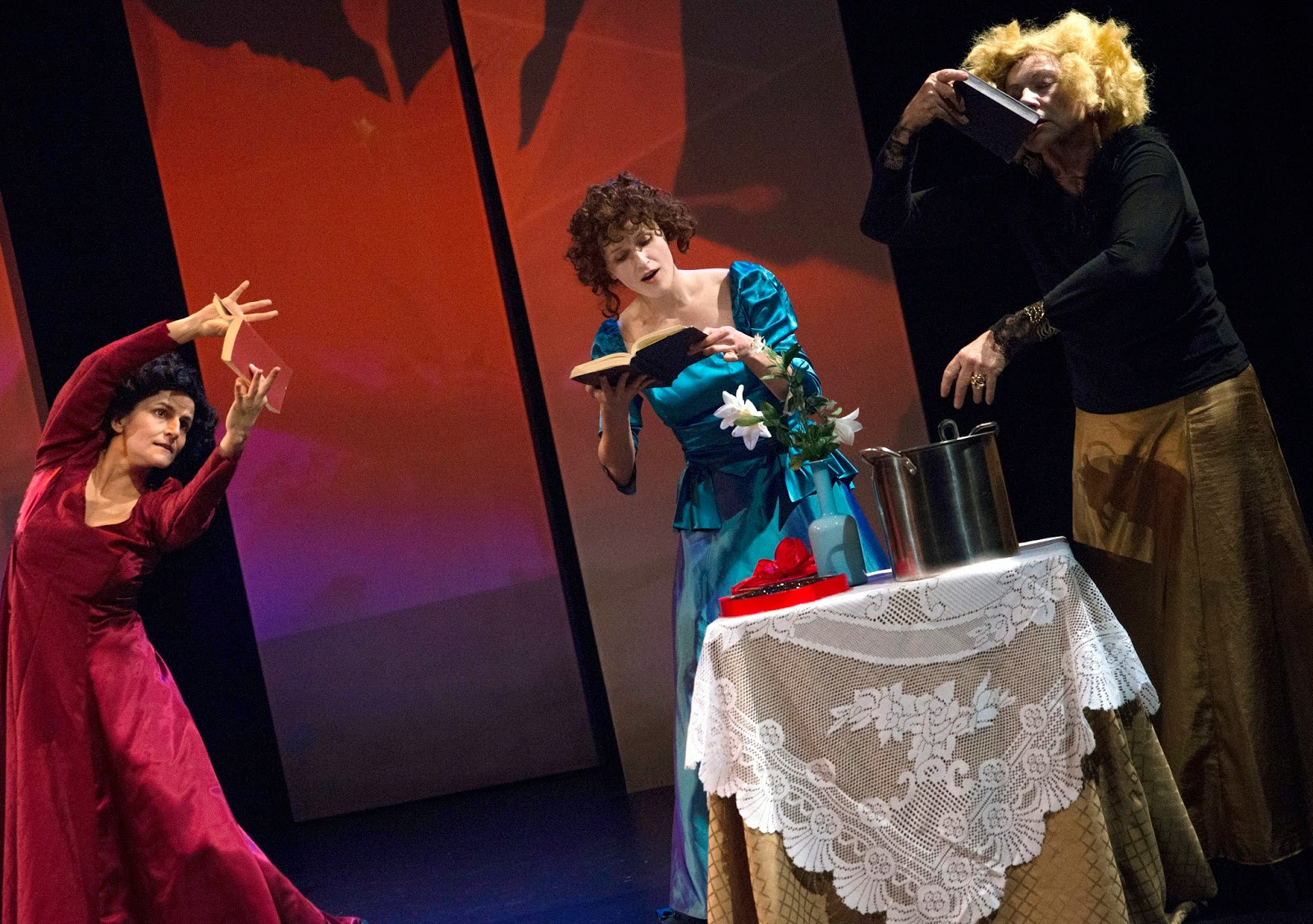It’s not an ordinary book, with crisp black type on slick snow-white paper. It consists of stitched rags and metal fragments left from the grenades the women in a Nazi slave labor camp were forced to drill. It is a book of simple domestic images with personal meaning, small enough to hide from the guards, created secretly by one Hungarian woman for another in the final and most ferocious months of the Holocaust. It is a scrapbook of survival, handmade in hell.
Dell’Arte’s
Joan Schirle happened to see an art exhibit in Canada with digital blowups of
these images. Both the book and the woman who received it did survive. “I
experienced a profound emotional shift when I saw these images of things
crudely fashioned yet powerful, that seemed both banal and sacred at the same
time,” Schirle wrote later. They inspired a stage piece, Elisabeth’s Book, which previews
Wednesday (July 23) and opens Thursday for a weekend run at Dell’Arte in Blue
Lake.
There are three scenes in this one-act play, revised from its April “in-progress” version. Created
by actors Schirle, Laura Munoz and Ruxandra Cantir and director and designer Alain Schons, Elisabeth’s Book tells the story of
three women with music, dance, poetry, projections and live video.
The first scene depicts their
ordinary middle class life in Hungary, emphasizing their love of books and
music. The second is set in the Nazi
camps and shows the making of the book. The third scene takes place in a
little-known period between the European war’s end in 1945 and the massive
Marshall Plan aid from the U.S. in 1948, when in Winston Churchill’s words, Europe
was “a rubble heap, a charnel house, a breeding ground of pestilence and
hate.” Like many others liberated from
the Nazi camps, these stateless and penniless women wandered, sometimes finding
themselves in camps again, not as prisoners but as refugees.
For
Schirle, it is a story of survival that applies beyond historical circumstances
to ever-present possibilities of today.
“These women wouldn’t have made it without each other, without
friendships. Creative acts like Elisabeth’s book or the recipe books they made
and the actors and singers in the camps were also vital to their survival.”
“We
aren’t trying to encompass the Holocaust,” Schirle said. “Nothing can. The danger is always the sentimentalization of the
unspeakable. But these are ordinary
women and their stories deserve to be told and remembered. It’s also important to realize that anyone’s
life can be changed in the world we’re living in. There are millions of
displaced people in the world right now.”
Even
apart from its physical theatre style, the play is not a documentary (Schirle
points out that the character she plays would have been considered too old to
work and therefore killed.) But it is
based on real characters and events, especially on Elisabeth Raab and her
memoir, And Peace Never Came. Today Raab lives in Toronto, and her son will attend a performance
in Blue Lake. Though (like other Holocaust victims) Raab couldn’t find a way to
write about these events until the 1990s, she kept the book made for her at the
Lippstadt camp exactly 70 years ago.
Among
the projections during the show are images from that book that Schirle first
saw in Canada, by artist Thelma Rosner, Elisabeth’s grand-niece. Here's the link to images from the exhibit posted on the artist's website.
Schirle traveled to Europe to meet with director Schons, who lives and works in France. They had worked together when Schons was at Dell'Arte. One of the things she learned was the meaning of a name on a page of Elisabeth's book: "Geraldy." It is Paul Geraldy (photo left), a French poet who was popular in pre-war Europe. His name was there because Elisabeth and her friends loved his poetry. So some of his work is included in the show, as well as lines by poets Emily Dickinson, Robert Denos and others.
Elisabeth's Book is also influenced and informed by other Holocaust memoirs, notably by poet and playwright Charlotte Delbo (photo right). Here's more information on her.
Original music for Elisabeth's Book was composed by Tim Gray, Gina Leisxman and Schirle. Lighting is by Michael Foster, costumes by Lydia Foreman and
sound design by Tim Gray. Here's a video excerpt plus Schirle and Schons talking about the piece.
Elisabeth’s
Book is performed in the Carlo Theatre at Dell’Arte, July 23-27 at 8
p.m. 668-5663, www.dellarte.com.



No comments:
Post a Comment